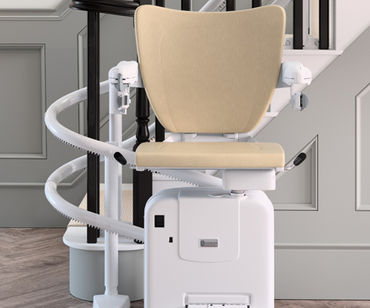How mindfulness can help older people

Mindfulness is the art of being present in the moment you are in and involves being mindful of every action you are taking. Meditation is the main form of practising mindfulness, although it can also be achieved by focusing your mind on specific everyday tasks. The ultimate goal in doing this is to become mindful every moment of the day and fully immersed in the moment that you are experiencing.
Mindfulness meditation is really very simple and can be practised by all, regardless of if you are a straight stairlift user or not. It involves sitting or lying down, closing your eyes, becoming fully aware of your breathing, and then making sure that your mind does not wander, focusing just on your breath. A handy step-by-step breakdown can be found here to help you learn the art.
But what are the benefits of mindfulness? Well, they are truly legion, especially for older people, and in this article, we are going to highlight some of the most important of them. Read on to learn how mindfulness can help older people.
It can help fight off depression

Padraig O’Morain, a mindfulness practitioner and instructor, advises: “Mindfulness helps people to get more enjoyment out of their good times and to handle their bad times better. Mindfulness also helps people to be less reactive to negative emotions and to see a wider range of choices.”
Depression is something that can impact us all. Many of us deal with feelings of sorrow and despair and, when ignored, they can easily spiral out of our control. In older age, depression is a fairly common fact of life for many, not helped by the loss of loved ones, painful ailments, and loss of independence. Luckily, mindfulness can truly help in this regard as it teaches us to look at our emotions from afar and not to give into them. By practising mindfulness, the individual learns not to judge themselves for feeling a certain way and also feel more connected with the world around them, therefore fighting off feelings of loneliness.
An accessible way to stop loneliness
Loneliness can be quite prevalent in older age, with a lack of mobility sometimes leading to increased isolation. There are a number of ways to combat loneliness and it’s great to know that mindfulness is one of them. Shamash Alidina, a mindfulness practitioner who runs workshops and conferences across the world, told us: “One of the challenges of growing older is you often feel more isolated and lonelier, but research has shown mindfulness practise reduces the feeling of loneliness in older people. Mindfulness doesn’t require you to move physically at all If you don’t want to. So, if you want to practise being mindful while sitting, lying down or eating, that’s fine!”
Shamash also offered some advice older people interested in mindfulness: “My main advice for older people wanting to practise mindfulness is to just go ahead and give it a go. You can either find a teacher, read a book on the subject or even listen to a guided audiobook on mindfulness. Start small. Even one deep breath a day after you wake up is a great start. Build from there.”
See yourself in a better light

One of the most dangerous things that we can do as humans is to compare ourselves to other people and not to the person we were yesterday. Everyone has different circumstances, so to judge ourselves by others’ success or happiness is a fool’s errand. Sarah Steckler of the Mindful Productivity Blog, says that mindfulness can help us look at ourselves in a healthier way:
“The beautiful thing about mindfulness is that it applies to anyone at any stage of life. We often make assumptions about our circumstances, we compare ourselves to others and often judge where we are in our lives. Mindfulness practice can allow individuals to reflect and focus in on being present, being still and looking inward to see what they are really being called to notice. Practicing mindfulness means being present, it means creating self-awareness and creating personal boundaries about what you need most at this chapter in your life.”
Improves digestion
As we age, issues with regards to digestion can become more prevalent, creating great discomfort in our bodies and making life quite unpleasant in extreme circumstances. The good news is that mindfulness is also thought to help in this department too, as the deep breathing that is involved in meditation actually helps to improve not just circulation within our bodies but also the level of oxygen found in our blood. If you are suffering from digestive issues that aren’t associated with another condition, mindfulness might very well prove to be extremely beneficial.
On this very topic, Sarah also comments on another fascinating way that mindfulness can help improve digestion, among other biological processes: “Being mindful and intentional on a daily basis can help individuals increase their vagal tone, a key component in the activation of the parasympathetic nervous system responsible for ‘rest and digest.’ This means that when you focus on your breathing, responding vs. reacting to emotions, and make self-care a priority, you give your overall wellness a boost.”
Learn to appreciate the moment

By practising mindfulness, older people can learn not to obsessively worry about the future, be it their health, finances, or whatever else may be bothering them. Mindfulness helps you to appreciate the moment you are currently experiencing by focusing on the here and now. People who don’t practise mindfulness are often distracted, always concerned with something else, always thinking about another task or issue. But once mindfulness enters your life, you become grateful for every moment and appreciate the simple pleasures to be garnered from even the simplest tasks.
Padraig O’Morain describes how mindfulness meditation works in this situation: “When you practise mindfulness, you gently bring yourself back into the present moment every time you notice that you have drifted back to the past or into the future or whenever you are lost in thoughts or fantasy. However, you can best do this by returning your attention to what your senses are bringing you: your breathing or what you see, feel, hear, touch or smell.”
Encourages relaxation and calmness
Life can be stressful at the best of times and when we get older this anxiety can be amplified thanks to all that comes with the process of ageing. So, learning to relax and take a breath from whatever is causing you stress can be a tremendously important tool to add to your arsenal. It’s vital that we find the time to just stop and appreciate the important things in life and this is where mindfulness comes into play. Meditation is known to help relaxation and bring about a serene calming effect that washes over the participant like a wave. It also has the benefit of helping to arrange one’s thoughts, something that is particularly helpful during stressful times.
Enhances cognitive function

The human mind doesn’t quite operate at the same capacity in older age, with memory loss and cognitive function suffering as a result. Loss of memory can be a truly terrifying and frustrating state of affairs, so it is wonderful to know that mindfulness with its concomitant breathing exercises can help combat the onset of dementia-related diseases and even improve memory. As meditation stimulates the brain’s memory centre, mindfulness almost becomes a must for those worried about memory loss or starting to experience a diminution in cognitive function.
The benefits of mindfulness for older people
- It can help fight off depression
- An accessible way to stop loneliness
- See yourself in a better light
- Improves digestion
- Learn to appreciate the moment
- Encourages relaxation and calmness
- Enhances cognitive function
This news article is from Companion Stairlifts. Articles that appear on this website are for information purposes only.



